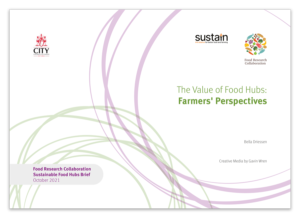This briefing is based upon an independent survey of a representative sample of farmers across England and Wales, designed to explore farmers’ experiences of food system infrastructure and supply chains, and what changes they would like to see. Our analysis focuses on food hubs as a route to market – the means by which producers are able to retail their food to eaters. We have looked both at farmers who report already selling through a food hub, and those who express an interest in selling through a food hub.
We found that food hubs, as a route to market, are largely seen as an opportunity to increase farm incomes, improve logistics and broker and maintain commercial relationships. There is also a strong belief that food hubs could help farmers improve animal welfare. There is a connection, though weaker, between selling through food hubs and delivering climate- and nature-friendly farming. Direct sales are seen by farmers to provide much greater opportunities for enhancing the environmental impact of farms. The surveyed farmers strongly believe that their food can be sold locally, but feel they lack the infrastructure, time and money to change their route to market.
The sustainability assessment framework which FRC is currently developing in collaboration with several food hubs will help make the case that food hubs not only provide aggregation infrastructure, but can also deliver a number of benefits for nature, the climate and local communities.


